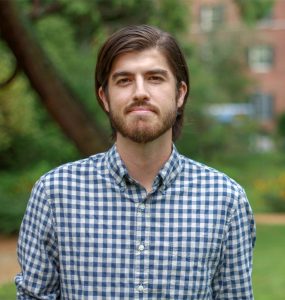Inspired by students, Royster fellow works to improve social and mental health among teenagers

Much has happened on Matthew Clayton’s journey to graduate school at the University of North Carolina at Chapel Hill. After graduating from Duke University with his bachelor’s degree in history, he applied for Teach for America and taught high school students in Arkansas. “It was during my time as a teacher and mentor that I experienced the insufficiently met mental health needs of our students, prompting a career change to psychological research,” he says.
After briefly serving in research positions at the University of Texas at Austin and at UNC-Chapel Hill, he subsequently began graduate studies at UNC-Chapel Hill in August 2018.
Clayton, a first-year doctoral student in psychology, is a member of The Graduate School’s Royster Society of Fellows and holds a National Science Foundation Graduate Research Fellowship. In his answers below, Clayton discusses his research goals, his crucial relationship with his faculty mentor – and the importance of making some time to play bass in a local band.
Tell us about your background and why you chose Carolina for graduate school.
My path to the field of clinical psychology was slightly unconventional, considering I finished my undergraduate education at Duke as a history major with a certificate in global health studies. During my time as an undergraduate, I was also part of the Robertson Scholars Program, giving me access to incredible resources at both Duke and UNC, while also providing summer enrichment experiences. During my first collegiate summer, I worked in the Mississippi Delta as a summer program coordinator for the Sunflower County Freedom Project, which in turn served as my impetus for applying to Teach for America and eventually becoming a high school teacher in the Delta in Southeast Arkansas.
It was during my time as a teacher and mentor that I experienced the insufficiently met mental health needs of many of our students, prompting a career change to psychological research at the end of my teaching tenure. I worked briefly at UT-Austin researching gender and racial stereotyping attitudes in children, as well as risky behaviors in young adults, before accepting a position here at UNC as a project coordinator under Dr. Mitch Prinstein [the John Van Seters Professor of Psychology and Neuroscience] to study adolescent depression, self-harm and suicide from a peer relationship context. Dr. Prinstein’s work is a near-exact fit for my ongoing research interests, and my high regard for him and UNC’s world-class program made it an easy choice.
What should people know about your research and career goals?
Our lab is focused on understanding how adolescents’ interpersonal relationships are related to psychological symptoms. Currently, we are examining why some girls are at such high risk for self-injury and why others are susceptible to peer influence. My own personal work has been exploring why some teens engage in social behaviors that actually increase their likelihood of rejection and depression. I am also interested in how social rejection can change a teen’s physiology – even their DNA – in ways that can increase the risk for developing mental illness.
Beyond graduate school, my career goals remain open, as I want to consider the various paths afforded to those in the field of clinical psychology. Ideally, I would like to find a healthy balance between research, practice and mentoring of future generations of students. Most broadly, however, I want to play a role in addressing the ongoing need in the realm of prediction and prevention of suicidal thoughts and behaviors in adolescence. Hopefully, in addition to my ongoing and planned research projects mentioned above, I will find a way to pursue this need during my time as a graduate student.
You are a member of the Royster Society of Fellows and a National Science Foundation Graduate Research Fellow. How are these fellowships supporting your research and career goals?
I am very humbled to be a part of the Royster Society of Fellows, especially from all I have learned of the broad, impactful research of the fellows in my cohort, in departments all across campus. Hopefully, I will uncover a way to collaborate with some of my colleagues in a multi-disciplinary fashion, whether it is the teaching of a first-year seminar or in broader, community-level efforts at the service of UNC’s student body.
Along with the Royster fellowship, my NSF fellowship will afford me the flexibility to focus more time on furthering my research and career goals, while also providing time to engage in other projects I otherwise would not have the hours or resources to pursue. Ideally, this will translate to higher productivity for our lab, while also benefiting the greater UNC community as I begin to explore ways to engage with the student body from the perspective of clinical psychology and mental health.
How have you become involved in the campus and local communities?
I currently am still putting down my roots in the campus and local communities to some extent, but I am fortunate that I have lived in the Triangle for more time than most at the beginning of their graduate studies. In addition to the pursuit of my previously mentioned goals, I try to remain grounded with other interests outside of the field of clinical psychology. I play bass in a band that plays locally in Chapel Hill and Durham, and I regularly play tennis with friends and in local tournaments. As someone committed to the promotion of mindful and self-compassionate mental health attitudes, I try to maintain as healthy of a work-life balance as possible.
